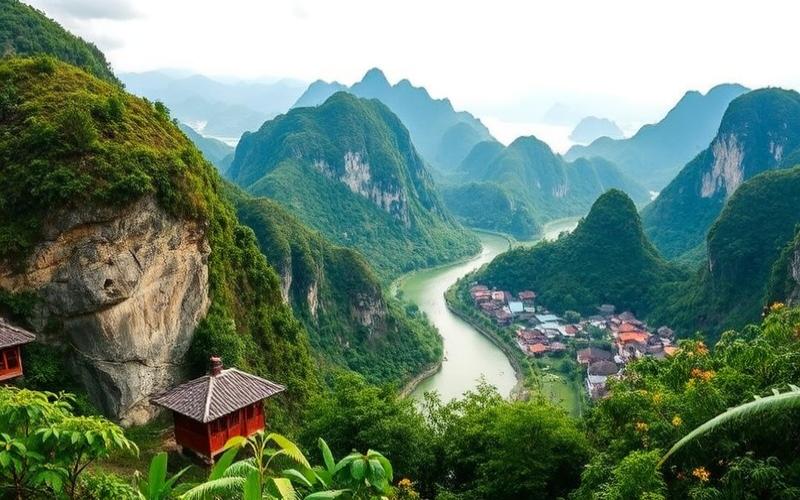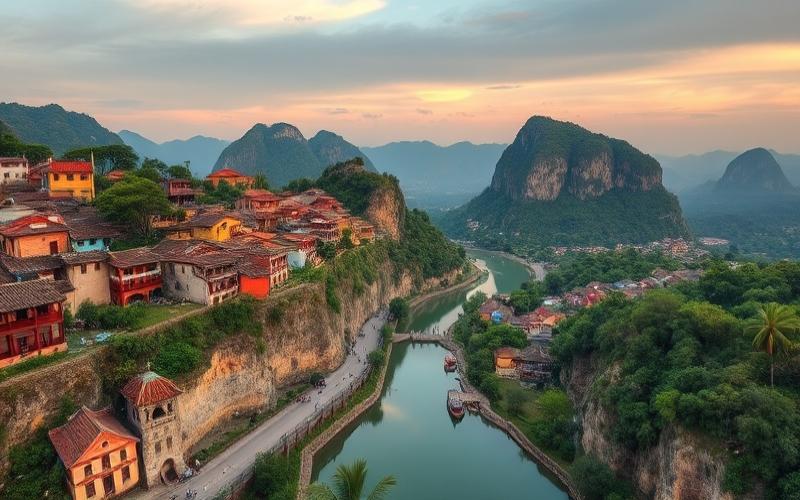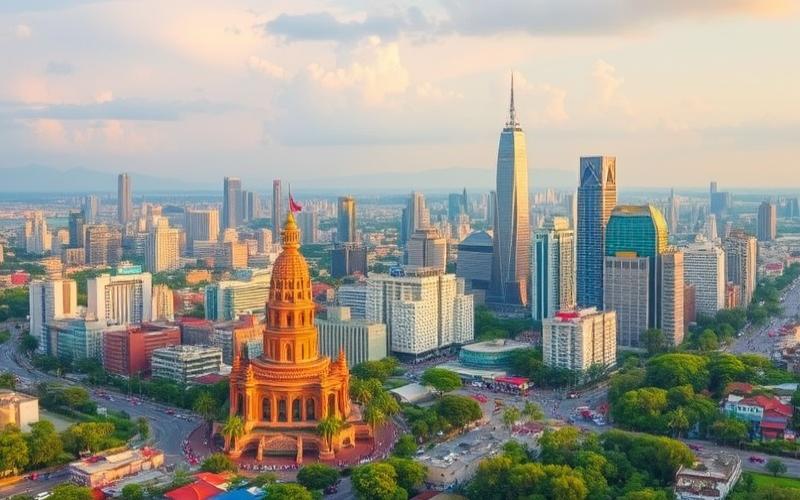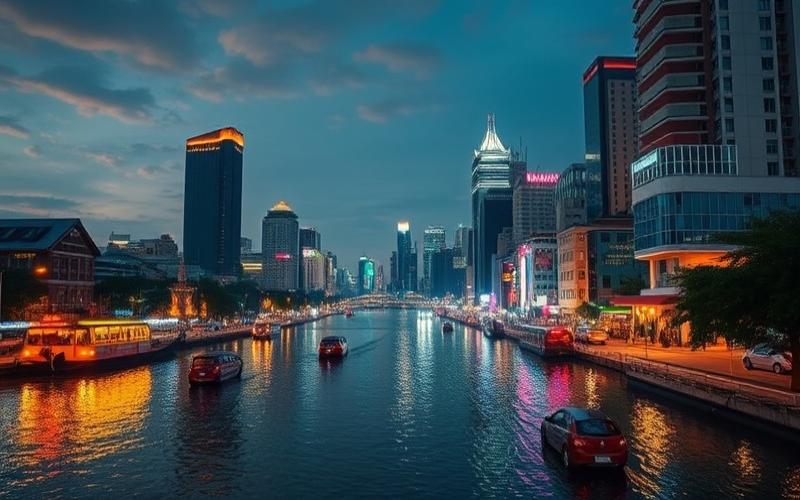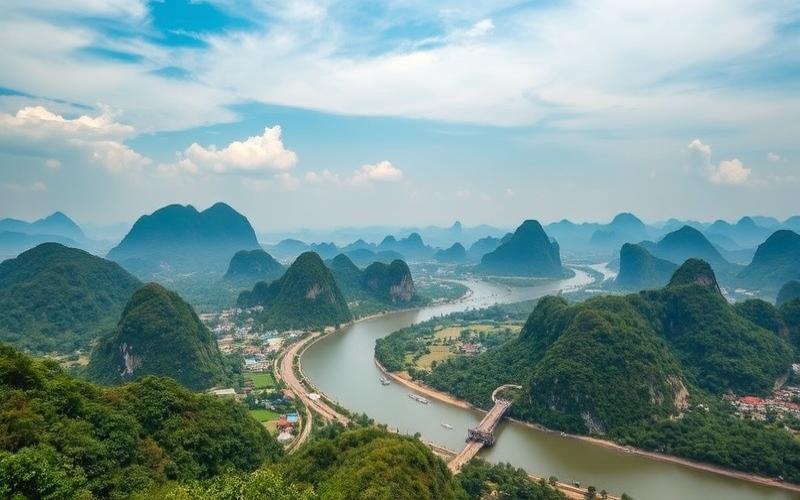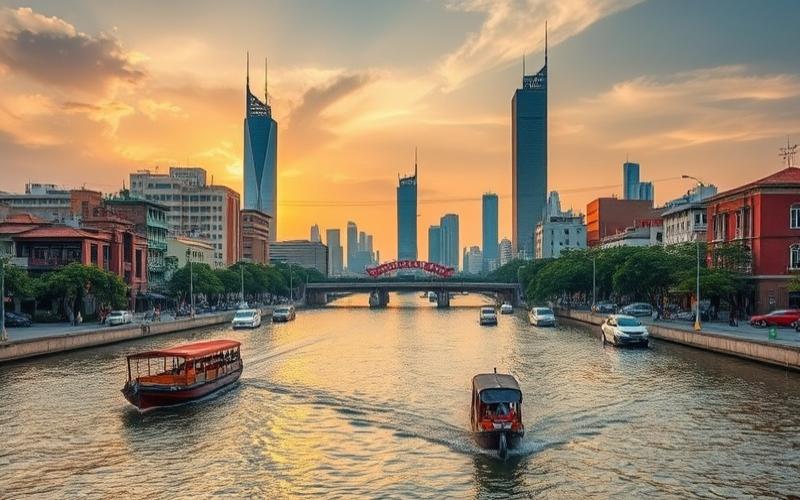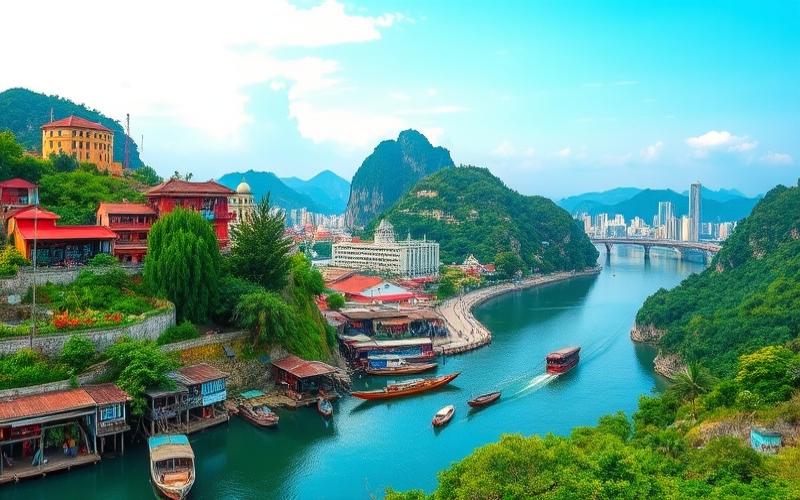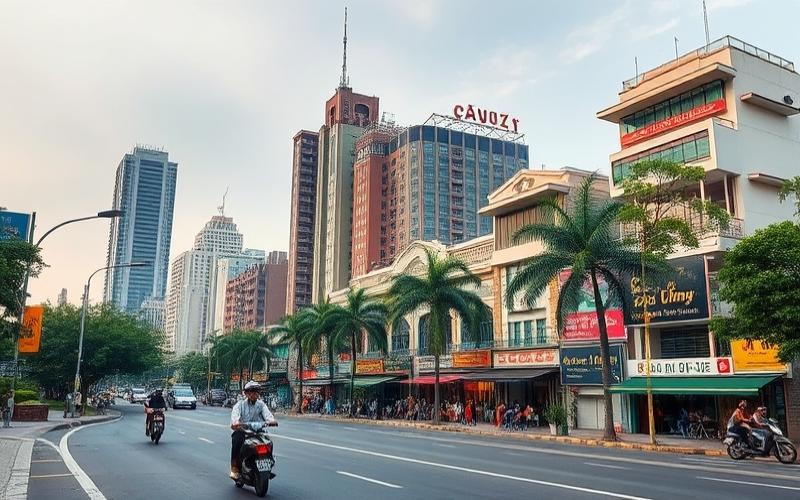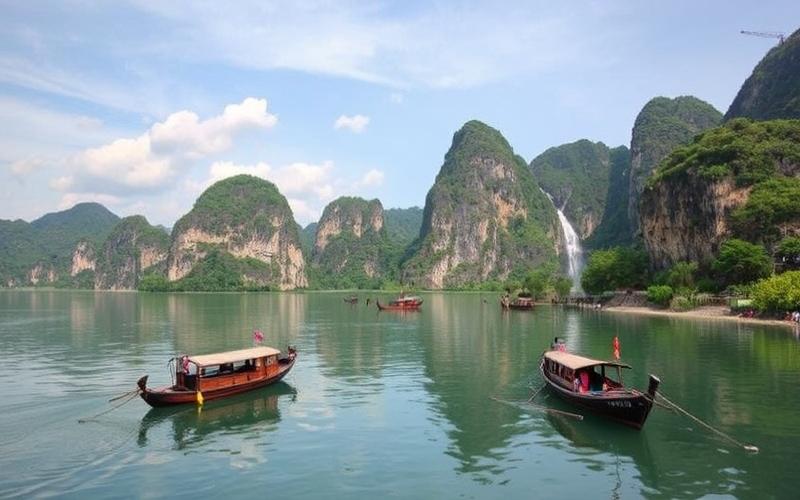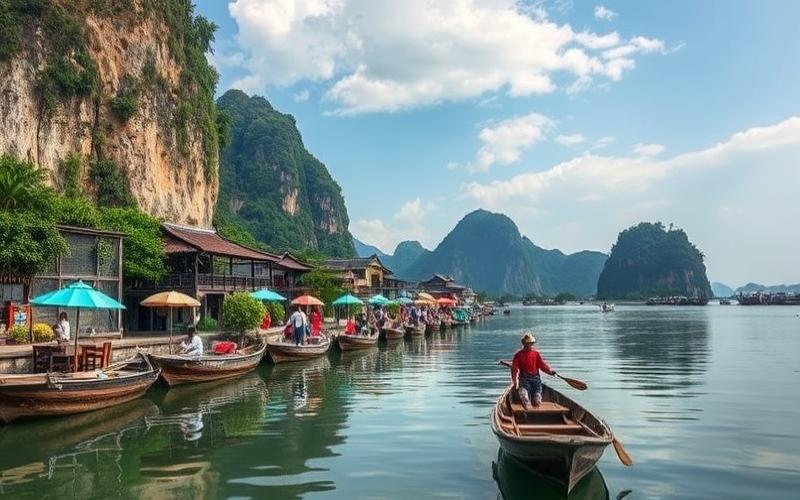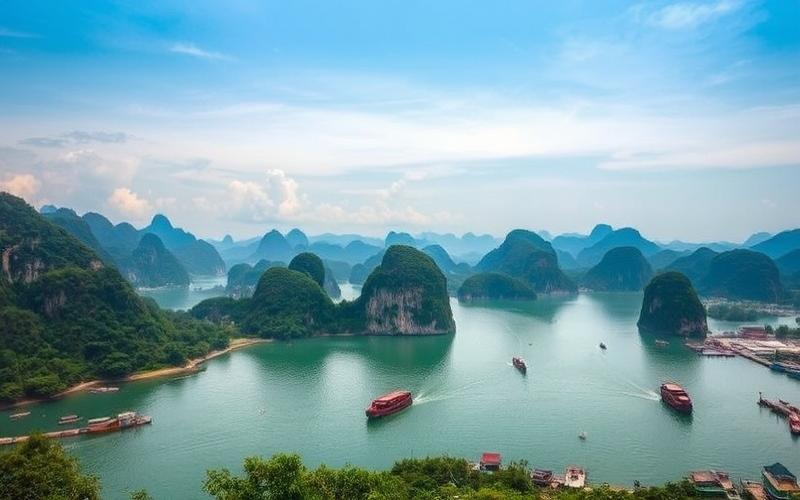
 Published on and written by Cyril Jarnias
Published on and written by Cyril Jarnias
The Vietnamese real estate market is booming, attracting attention from investors worldwide due to impressive growth rates and favorably diversified investment opportunities.
Despite challenges such as government regulation and global economic fluctuations, Vietnam continues to stand out with its rapid urbanization and growing domestic demand for modern housing and quality urban infrastructure.
While major cities like Hanoi and Ho Chi Minh City see the emergence of ambitious new projects, the market is also expanding into less urbanized regions, thereby boosting local economic activity and offering a more varied range of options for investors.
Hot Sectors: Identifying High-Growth Potential Areas
High-Growth Potential Hot Sectors in the Vietnamese Real Estate Market
Major Economic Factors Influencing Real Estate Growth
- Rising Foreign Direct Investment (FDI): $25.4 billion in 2024 (+9.4% year-over-year), stimulating real estate zone expansion and demand in strategic sectors.
- Massive Infrastructure Development: Proliferation of highway, metro line, industrial zone, and urban hub projects, enhancing the appeal of major metropolitan areas and certain neighboring provinces.
- Population Growth and Middle-Class Boom: Increased purchasing power, rapid urbanization, heightened demand for modern housing and associated services.
- Regulations and Investment Environment: Improved legal frameworks, simplified transactions, and government support for real estate investment.
High-Growth Regions and Emerging Hubs
| Region | Key Factors | Trends & Recent Developments |
|---|---|---|
| Ho Chi Minh City | Economic center, major infrastructure (metro, roads), strong FDI appeal | High-end residential projects, modern commercial spaces, eco-districts |
| Hanoi | Political capital, population growth, new business districts | Office real estate expansion, expatriate residences, mixed-use spaces |
| Bac Giang | Industrial development, proximity to Hanoi, growing FDI | Industrial zones, logistics parks, new residential neighborhoods |
| Da Nang & Central Region | Tourism development, appeal for retirees/expatriates | Beachfront residences, resorts, luxury apartments |
| Southeastern Provinces (Binh Duong, Dong Nai) | Industrial zones, major logistics projects, rapid growth | Worker housing, industrial parks, commercial real estate |
Growth Statistics and Forecasts (2025-2026)
- Economic Growth Forecast: Average score of 7.45/10 for 2025, and 8.13/10 for 2026 according to industry professionals.
- Real Estate Market Confidence Index: 7.08/10 in 2025, expected to rise to 7.95/10 in 2026.
- Industrial Real Estate: Expected surge driven by FDI and growth in technology industries.
In-Demand Property Types
Modern Condominium Apartments
- Most attractive segments (22% of investor demand).
- Target young professionals, expatriates, urban middle class.
- Demand for security, services, and smart solutions.
Next-Generation Commercial Spaces and Offices
- Increased demand in city centers and new business districts.
- Need for flexible, connected spaces adapted to e-commerce.
Industrial and Logistics Real Estate
- Booming logistics parks and industrial zones, especially around major transport routes and ports.
- Appeal to foreign investors and manufacturing companies.
Green Solutions and Eco-Districts
- Rise of projects integrating energy efficiency, green spaces, and environmental respect.
- Response to growing sensitivity for sustainability and quality of life.
Trend Evolution Reflecting Economic and Societal Changes
- Rapid Urbanization: Multiplication of large-scale projects to absorb rural exodus and meet urban growth.
- Digitalization and Demand Sophistication: Demand for connected homes, smart buildings, and premium services.
- Rising Environmental Concerns: Integration of green infrastructure, eco-certifications, and valuation of environmentally friendly living spaces.
- Internationalization: Growth in foreign investment, adaptation of real estate offerings to international standards and expatriate needs.
Good to Know:
Among the hot sectors in the Vietnamese real estate market, Ho Chi Minh City, Hanoi, and Da Nang stand out due to a series of significant economic and urban developments. The influx of foreign investment, particularly from South Korea and Japan, is driving demand for modern office buildings and high-quality residential complexes. Major infrastructure projects, like the Hanoi Metro and the North-South Expressway, enhance the appeal of these areas. Furthermore, urban population growth, projected at a 3% annual increase by 2030, fuels the expansion of affordable housing and eco-friendly apartments to meet the needs of an increasingly environmentally conscious population. Mixed-use commercial spaces, integrating offices, retail, and residences, are particularly sought after, reflecting a shift towards integrated and sustainable urban lifestyles.
Key Takeaway:
The Vietnamese real estate market is experiencing sustained momentum, driven by foreign investment, infrastructure modernization, upscaling demand, and rapid urbanization. Major metropolitan areas, peripheral industrial zones, and central tourism hubs concentrate the most notable developments, while sought-after properties reflect a changing society that is more urban, connected, and environmentally conscious.
Price Evolution: An Analysis of Market Fluctuations
The past five years have been marked by remarkable volatility in Vietnamese real estate prices, with a general upward trend in major cities like Hanoi and Ho Chi Minh City, despite fluctuations due to various macroeconomic and regulatory factors.
Numerical Data on Price Variations (2019-2025)
| City | Cumulative Apartment Price Increase (2019-2025) | Average Price End of 2024 (VND/m²) | Strongest Recent Variation |
| Hanoi | +64% | Approx. 60 to 70 million | +29.6% in Q1 2025 |
| Ho Chi Minh City | +32% approx. | >70 million | Moderate increase, stabilization |
- In Hanoi, the average price per square meter rose from about 40 million VND in 2022 to over 70 million VND by the end of Q3 2024.
- In Ho Chi Minh City, growth has been more moderate but remains steady; the market is shifting towards increased supply in the periphery.
Periods of Increase and Decrease
- 2019–Early 2022: Strong growth due to post-pandemic demand and supply shortage.
- Late 2022–Mid-2023: Slowdown with stability or slight local decline linked to government restrictions on real estate credit.
- Late 2023–Early 2025: New acceleration (+26% for existing and +36% for new properties in Hanoi), stimulated by major legislative reforms.
Key Points Explaining These Fluctuations
- Policy Reforms and Land Laws
- Anticipated implementation of new land and housing laws from early/mid-2024.
- Strengthened legal framework reassuring domestic and foreign investors.
- Supply vs. Demand
- Supply constrained until mid-2024; marked rebound thereafter (35,000 new units launched / 40,000 planned for 2025).
- Despite this rebound, supply remains below pre-pandemic peaks.
The Vietnamese market thus appears atypical in its regional environment—a resilient market where any future correction will essentially depend on maintaining positive economic flows associated with the effective success of recent regulatory measures.
Good to Know:
Over the past five years, real estate prices in Vietnam have experienced marked fluctuations, particularly in Hanoi and Ho Chi Minh City. In 2020, prices surged by about 10% due to renewed interest from foreign investors, followed by a decline in 2021 caused by the pandemic and its economic effects. Recent economic policies, such as accelerated infrastructure development and eased regulations for foreign buyers, contributed to a 15% price increase in 2022. However, interest rate variations moderated this growth in 2023. Comparatively, cities in neighboring countries like Bangkok and Jakarta have shown parallel trends, though often less pronounced, highlighting the unique dynamics of the Vietnamese market dominated by strong domestic demand and a complex interplay between government regulation and foreign investment appeal.
Real Estate Investments: Which Property Types to Prioritize in Vietnam?
The Vietnamese real estate market is currently highly attractive, driven by sustained economic growth, an expanding middle class, and significant infrastructure investments. Investors are turning to varied segments, influenced by rapid urbanization, city modernization, and increased buyer sophistication.
| Property Type | Advantages | Disadvantages | Most Sought-After Regions |
| Residential (apartments, subdivision houses) | – Strong demand, especially in condominiums – Good liquidity – Suited to urban growth | – Returns sometimes limited compared to commercial – Regulations on foreign ownership | Hanoi, Ho Chi Minh City, Da Nang |
| Commercial (offices, retail, coworking) | – Attractive rental yields – Strong demand for flexible spaces (coworking) – Appreciation potential | – Sensitivity to economic conditions – Risk of vacancy | Hanoi, Ho Chi Minh City, major urban areas |
| Industrial (warehouses, factories, logistics) | – Benefits from industrial growth and e-commerce boom – Growing demand from multinationals | – High initial investment – Dependence on infrastructure development | Industrial provinces around Hanoi (Bac Ninh, Hai Phong), Ho Chi Minh City (Binh Duong, Dong Nai) |
Emerging Trends and Demand by Segment:
- Condominium Apartments:
- Strong demand in major cities, driven by rising purchasing power and urbanization.
- Sought after by young professionals and the growing middle class.
- Attractions: security, integrated services, ease of management.
- Subdivision Houses:
- Popular with families and local investors.
- Appreciated for their space, appreciation potential, and relative scarcity in city centers.
- Coworking Spaces:
- Rapid expansion in Hanoi and Ho Chi Minh City, meeting the growth of startups, freelancers, and international companies.
- Lease flexibility, adaptation to new work modes.
High-Potential Regions:
– Hanoi and Ho Chi Minh City: Economic and urban hearts, major concentrations of condominium apartments, offices, and coworking spaces.
– Peripheral Industrial Regions: Bac Ninh, Hai Phong, Binh Duong, Dong Nai, driven by industrialization and foreign investment influx.
Key Factors for a Real Estate Investor in Vietnam to Consider:
- Profitability Potential:
- Competitive rental yields, especially in residential and commercial in major cities.
- Expected capital gains with infrastructure development and continued urbanization.
- Economic Stability:
- Sustained economic growth, rising middle class, market deemed dynamic for 2025-2026.
- Risks related to global economic conditions to monitor.
- Regulatory Developments:
- Improving investment environment, but regulations still evolving, particularly on foreign ownership (limits on condominium quotas accessible to foreigners).
- Importance of local legal support to secure transactions.
- Accessibility and Infrastructure:
- Areas near new transport infrastructure see their appeal and value increase rapidly.
The Vietnamese real estate market offers attractive opportunities in 2025-2026 but requires a detailed analysis of segments, regions, and the legal framework to maximize profitability and secure investments.
Good to Know:
In Vietnam, real estate investments are expanding rapidly, with different property types favored depending on regions and market needs. Condominium apartments and subdivision houses are highly sought after in major cities like Hanoi and Ho Chi Minh City to meet the growing demand for urban housing. Coworking spaces, meanwhile, are developing thanks to the rise of startups and remote work culture. Commercial properties offer good profitability potential, especially in dynamic urban areas, but require a thorough understanding of regulatory changes. Conversely, industrial properties present interesting opportunities on the outskirts of major cities, ideal for investors looking to benefit from the country’s economic growth. For a successful investment, it is crucial to consider Vietnam’s economic stability, analyze local market trends, and stay informed about current real estate laws.
Disclaimer: The information provided on this website is for informational purposes only and does not constitute financial, legal, or professional advice. We encourage you to consult qualified experts before making any investment, real estate, or expatriation decisions. Although we strive to maintain up-to-date and accurate information, we do not guarantee the completeness, accuracy, or timeliness of the proposed content. As investment and expatriation involve risks, we disclaim any liability for potential losses or damages arising from the use of this site. Your use of this site confirms your acceptance of these terms and your understanding of the associated risks.




